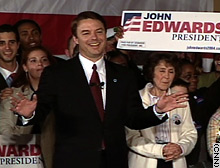Kerry wins four states, Edwards nets one
( 2004-02-04 10:15) (Agencies)
John Kerry rolled up big victories in delegate-rich Missouri, Arizona and two other states to solidify his position as Democratic presidential front-runner. John Edwards countered by taking his native South Carolina in a dramatic seven-state contest Tuesday.
 |
| U.S. Democratic presidential hopeful Sen. John Kerry addresses a campaign rally at a hangar at Spokane International Airport in Spokane, Wash. on Tuesday, Feb. 3, 2004. [AP] |
Edwards and Wesley Clark were a few hundred votes apart in Oklahoma, with Kerry close behind in the closest race of the night and a critical test for Edwards, who hopes to prove his presidential mettle outside the South. Howard Dean was shut out along with Joe Lieberman, who dropped out of the race.
"It's a huge night," Kerry told The Associated Press. "I'm stunned by it."
Racking up victories in Missouri, Arizona, North Dakota and Delaware, Kerry dismissed Edwards' singular win.
"I compliment John Edwards, but I think you have to run a national campaign, and I think that's what we've shown tonight," the four-term Massachusetts senator said. "You can't cherry-pick the presidency."
Missouri and Arizona were the night's biggest prizes, with 129 delegates — nearly half of the 269 pledged delegates at stake Tuesday. An AP analysis showed Kerry winning 52, Edwards 42 and 175 yet to be allocated.
In state after state, Kerry won among voters who wanted a candidate with experience or who could beat U.S. President Bush, exit polls showed.
 |
| Edwards celebrates his projected win in South Carolina. [CNN] |
Edwards had said he must win South Carolina, and he did by dominating among voters who said they most value a candidate who cares about people like them.
"We won South Carolina in a resounding fashion and won both the African-American and white vote in South Carolina, and we go from here to other states — Michigan, Virginia and Tennessee," Edwards told the AP. "It's very easy to lay out the map to get us to the nomination."
To the roar of his supporters, Edwards declared, "The politics of lifting people up beats the politics of beating people down."
Clark, a retired Army general from Arkansas, needed a victory in neighboring Oklahoma to keep his candidacy alive. His supporters were braced for a bad night.
"I think the general is about to meet Sitting Bull," said David Paterson, Senate Minority Leader of the New York legislature and a Clark backer.
Dean plans to continue campaigning without a victory, though advisers privately acknowledged that his chances for a political revival were slim at best.
"We're going to have a tough night," Dean told supporters as he promised to keep "going and going and going and going — just like the Energizer bunny."
At stake were 269 pledged delegates — more than 10 percent of the 2,162 needed for the nomination — in Missouri (74), Arizona (55), South Carolina (45), Oklahoma (40), New Mexico (26), Delaware (15) and North Dakota (14).
An AP analysis of the delegate count showed Edwards winning 26 of the 269 total pledged delegates at stake Tuesday night, Kerry netting 18 and 225 delegates yet to be allocated.
Kerry, who just six weeks ago was written off as a candidate, reshaped the race with victories in Iowa and New Hampshire. "I'll keep working and fighting until I win the nomination, and then I'll keep working and fighting until I beat George Bush," he told the AP.
In nearly every region of the nation, the most diverse group of Democrats yet to cast votes this primary season said they had a singular priority: Defeat President Bush this fall.
"I don't care who wins" the Democratic primary, said Judy Donovan of Tuscon, Ariz. "I'd get my dog to run. I'm not kidding. I would get Mickey Mouse in there. Anybody but Bush.'"
Kerry is racking up endorsements as he tries to unite the party behind his front-running candidacy. To that end, the 1.2 million-member American Federation of Teachers, the country's second largest teachers' union, planned to back Kerry on Wednesday, a senior union official said on condition of anonymity.
For the voters, nearly half of them in five states said they made up their minds within the last week. One in five waited until Tuesday to pick a candidate.
Even Democrats who didn't vote for Kerry appear fairly comfortable with him. Large majorities of voters — ranging from about 70 percent in Oklahoma to more than 80 percent in Delaware — said they would be somewhat or very satisfied if Kerry wins the nomination.
Edwards scored well among whites, older people, the less-educated and voters who called themselves moderate or conservative, according to exit polls in South Carolina. Edwards split the black vote with Kerry, despite the Massachusetts senator's high-profile endorsement from Rep. Jim Clyburn, the state's most influential black politician.
Nearly half the voters in South Carolina were black and nearly one in six in Arizona were Hispanic, the first contests with sizable minority populations in the primary campaign. In Missouri and Delaware, about 15 percent of the voters were black.
Kerry and Clark, both Viet Nam veterans, had plenty of company. Seven in 10 Oklahoma voters, and nearly that many in South Carolina, said they had served in the military or have somebody in their households who did, according to exit polls conducted for The Associated Press and the television networks by Edison Media Research and Mitofsky International.
Looking beyond Tuesday, Kerry planned visits in Washington state and Michigan, where polls show him leading Saturday's caucuses. Edwards will skip ahead to Virginia and Tennessee, site of contests Feb. 10. Both campaigns plan to air ads in the two southern states.
Kerry plans to buy ad time in Washington, D.C., to reach Democratic-heavy northern Virginia, aides said. It's an expensive market, and it was unclear whether Edwards would have the money to match Kerry ad-for-ad as he did in Tuesday's states.
Dean, a former Vermont governor, ran out of cash and momentum after finishing third in Iowa and a distant second in New Hampshire. He ran no TV ads in the seven states and intended to stay off the air for a spate of other contests until Feb. 17, when Wisconsin votes.
On a deeply divided staff, some Dean aides were focused on raising money to cover campaign debts, an emphasis that gave a backseat to costly political tactics such as television commercials.
Democrats award delegates based on a candidates' showing in congressional districts, giving Kerry's rivals a chance to grab a few delegates even in states they lose.
In the run-up to Tuesday's election, the candidates stuck closely to their messages: Kerry railed against special interests; Edwards highlighted his small-town upbringing; Clark flashed his four-star military resume; Lieberman promised a centrist alternative to his rivals' liberal ways; and Dean cast himself as a Washington outsider.
But they took some jabs. Edwards and Dean criticized Kerry's ties to lobbyists, ignoring their own connections to special interests. Clark accused Kerry of flip-flopping on affirmative action.
Kerry fought back without losing his cool. He questioned first-term Sen. Edwards' electability and credentials, saying this is not the time for "on-the-job training."
The race turns next to Michigan and Washington state, with a combined delegate total of 204. Maine, Tennessee, Virginia, the District of Columbia, Nevada, Wisconsin, Hawaii, Idaho and Utah hold primaries or caucuses before a mega-state showdown March 2.
That's when delegate-rich California, Georgia, New York and Ohio join six other states for primaries or caucuses. Party leaders expect the nomination to be wrapped up by March 9, when Florida, Louisiana, Mississippi and Texas vote.
The last elections are June 8 in New Jersey and Montana, but Democrats hope to have a presumptive nominee in place well before then. Al Gore wrapped up the Democratic nomination in 2000 in early March, defeating Bill Bradley on a multistate election night. In that race, several weeks separated the New Hampshire primary, won by Gore, and the decisive contest in March.
Democratic leaders moved up several contests this primary season, hoping to unite the party behind a candidate early to challenge Bush, whose has raised at least $140 million.
|

